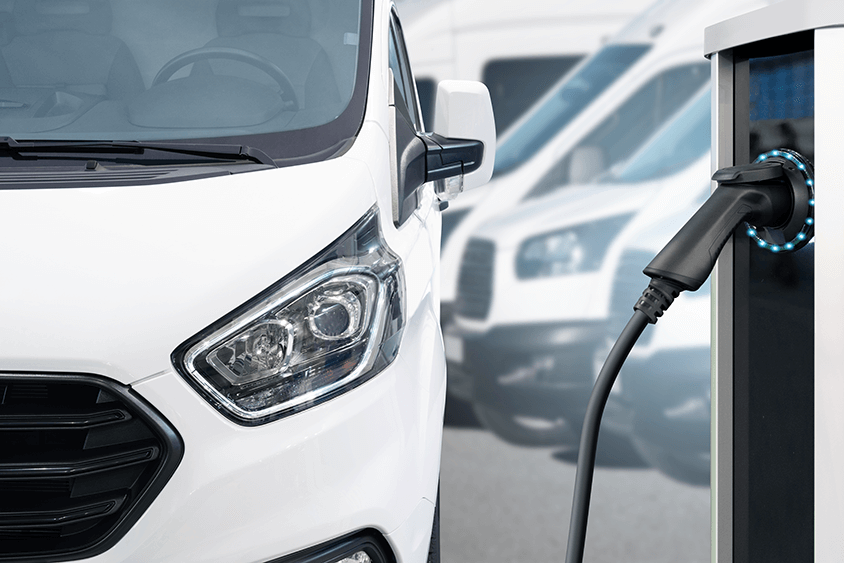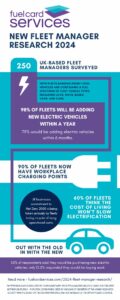Electrifying New Figures on Fleet EV Acquisition: FCS Fleet Survey 2024
Written by: Simon Pavey, Last updated:3rd May 2024

Expensive, inefficient, and hard to implement – is this the consensus on electric vehicles and fleet electrification today? Are EV fleets and electric company cars a pipe dream? Apparently not, according to UK fleets.
Fleet electrification has been a buzzword in the industry for some time. With government grants, growing benefit opportunities and the need for charging infrastructure all in frequent discussion, the team at Fuel Card Services set out to understand exactly how UK fleet managers feel about electrification, and when it’s likely to happen.
We commissioned a survey of 250 UK-based fleet managers operating a full spectrum of fleet vehicles and sizes. The independent insights helped us paint a picture of the reality of fleet electrification in 2024. Here’s what we found.
1. Electrification is accelerating
Despite the cost of living crisis that has been pinching the pockets of businesses worldwide, it’s evident that the cost of living can’t hold back fleets from adapting to the times and doing so in the immediate future. While the economic crisis might have put EV purchases on the back burner for many private drivers, fleet managers are gearing up to add electric vehicles to their fleet in spite of the impacts of the cost of living.
78.8% of respondents in the survey stated that not only would they be adding electric vehicles to their fleets but they would be doing so in the next six months. And overall, 98% of respondents stated that they would be expanding their electric fleet within the next year.
This staggering figure solidifies that the future of fleets is electric, and contrary to popular belief – this isn’t some distant ambition, it’s happening right now. We collected data from fleet managers operating a diverse range of fleets, including buses, HGVs, LCVs, as well as cars and bikes, and found a new trend:
2. All vehicle types are going electric
One of the most interesting angles in the discussion of fleet electrification is the pace at which we will see HGV fleets turn to electric options. Sure, most people accept that EV car batteries are good enough now to be considered a serious option, but given the weight of HGVs travelling long distances while carrying freight, is it really viable to power them electrically?
Survey results suggest this line of thinking is dated, with 84% of HGV fleet managers responding that they will be introducing electric vehicles to their fleets within 6 months. Electric HGVs have been making impressive developments in recent years, with companies like Tevva and DAF manufacturing electric HGVs with a range capability of up to 310 miles on a single charge – an impressive feat and one that has significant implications from HGV fleet electrification.
3. Is the UK ready to charge all of these vehicles?
It’s one thing to introduce electric vehicles to the fleet, but you also need to charge them. Businesses are ahead of the game with charging infrastructure with 90% of survey respondents saying they already have workplace chargers installed.
Government schemes like the Workplace Charging Scheme have been supporting the implementation of charging stations at business locations and the pay off of these schemes and investment by business is a significant growth in charging accessibility.
61% of respondents also stated that they support the installation of home chargers for employees either as a gift (28%) or via an interest free loan (33%). For employees looking to make the switch to an electric vehicle for their next company car or BIK vehicle, the availability of workplace charging as well as options for home charger installation will undoubtedly be encouraging.
4. ‘Cost of living’ can’t pull the plug on electrification
The increased cost of living has been a financial setback for households and businesses alike, but has this economic squeeze stopped fleet electrification in its tracks? According to the fleet managers we surveyed, the answer is “no”. While 32.4% of respondents did admit that the cost of living would slow the rate at which they acquired electric vehicles, almost 60% of respondents said that the green shift is inevitable, and the economy will be forced to evolve accordingly.
Contrary to popular belief, EV adoption will continue ahead at full steam, and businesses across the country will continue to make sustainable long-term investments that enable them to cut back on their carbon emissions meaningfully. Walking the tightrope between investing in sustainable initiatives and keeping the books in check is undoubtedly a hard task for businesses but, the UK’s commitment to Net Zero 2050 is being taken seriously by fleets today.
5. Out with the old, in with the new (vehicles)
Despite any consensus that the cost of living will slow the rate of electric vehicle acquisition, respondents demonstrated a keen preference for new electric vehicles over used. When asked what their fleet expansion plans look like, nearly 50% of respondents said they would be purchasing new electric vehicles while only 12.8% of respondents said they would be purchasing used electric vehicles.
The number of new vehicles licensed to fleets and businesses has been on the rise in recent years so this figure might come as no surprise. Nonetheless, the steep preference for new electric vehicles is also demonstrative of a desire to get the best ‘bang for buck’ when expanding electric fleets. Developments in EV tech have seen range capability skyrocket, with the average range increasing 10% each year since 2018, meaning the newer models offer the highest distance per charge and thus best value for money.
If you represent a UK-based fleet and would like to discuss navigating challenges such as charging issues, please get in touch with one of our experts.
Sample Data
The research was conducted by Censuswide with 250 fleet managers (18+) excluding sole traders between 08.03.2024 – 14.03.2024. Censuswide abide by and employ members of the Market Research Society which is based on the ESOMAR principles and are members of The British Polling Council.





